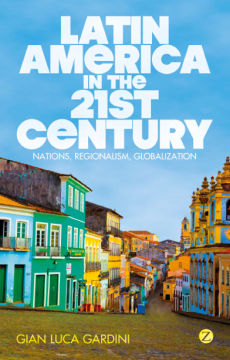
Additional Information
Book Details
Abstract
Twenty-first century Latin America is rich in history, culture, and political and social experimentation. In this fascinating and insightful analysis, Gardini looks at contemporary developments at three interconnected levels: state, region and globe.
At the state level, leaders such as Evo Morales of Bolivia and Chavez of Venezuela embody a renewed intellectual autonomy in the continent, while revealing significant discrepancies between their rhetoric and their actions. At the regional level, while a consensus has emerged over Latin American unity as the only way towards development, the existence of several competing schemes of regional economic and political integration more accurately reflect the diversity of the area. At the global level, elements of change, such as the rise of Brazil and the involvement of China as a new trade partner, sit alongside traits of continuity, such as the crucial political, economic and ideational role played by Washington.
Overall, Gardini argues that despite the numerous challenges to be faced, Latin America is now more wealthy, autonomous and better-placed in global geopolitics than at any time in its recent history.
Dr Gian Luca Gardini is Professor of International Relations and Latin American Politics at the Friedrich-Alexander University.
'An approachable, lucid and readable introduction to contemporary issues in Latin America. The book has the merits of making complex issues comprehensible without distorting them and of placing questions raised by social scientists in a clear context of contemporary history.'
Christopher Abel, Reader in Latin American History, University College, London
'The book has a strong and highly relevant analytical framework (rhetoric vs. pragmatism, unity vs. diversity, and change vs. continuity) and is innovative in its approach. It combines academic rigour with an impressive breadth of coverage.'
Peter W. Lambert, Senior Lecturer in Latin American Politics, University of Bath, and former president of the UK Society for Latin American Studies
'This book reflects very well on most issues facing Latin America in these first decades of the twenty-first century.'
Tullo Vigevani, Professor of Political Science and International Relations, Sao Paulo State Universitytate University
Table of Contents
| Section Title | Page | Action | Price |
|---|---|---|---|
| About the author | i | ||
| Introduction | 1 | ||
| ONE | The states of Latin America: between rhetoric and pragmatism | 6 | ||
| Introduction | 6 | ||
| Brazil | 8 | ||
| Argentina | 15 | ||
| Chile | 22 | ||
| Venezuela | 28 | ||
| Bolivia | 34 | ||
| An overview of the rest of Latin America | 40 | ||
| Conclusions | 48 | ||
| TWO | Latin American regionalism: between unity and diversity | 51 | ||
| Introduction | 51 | ||
| The roots and development of Latin American regionalism | 52 | ||
| Latin American regionalism during the Cold War | 55 | ||
| From open regionalism to the search for new solutions | 59 | ||
| Mercosur | 61 | ||
| NAFTA | 67 | ||
| The Andean Community | 71 | ||
| The inter-American system | 74 | ||
| Latin American regionalism in the new millennium | 81 | ||
| Conclusions | 88 | ||
| THREE | Latin America in the world: between change and continuity | 90 | ||
| Introduction | 90 | ||
| Relations with the United States: from the historical and philosophical roots to the end of the twentieth century | 91 | ||
| Inter-American relations in the twenty-first century | 97 | ||
| The present and future impact of the pink tide on US–Latin American relations | 106 | ||
| Relations with the European Union | 113 | ||
| Relations with China: return to Eldorado or return to dependency? | 124 | ||
| Conclusions | 128 | ||
| Conclusion | 130 | ||
| Notes | 133 | ||
| Bibliography | 136 | ||
| Index | 140 |
